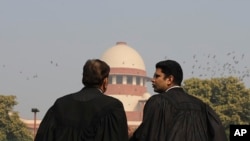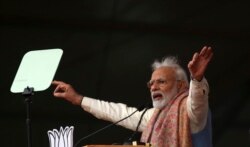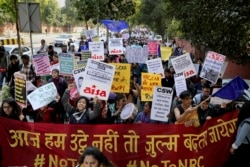India’s top court has refused to put on hold a a controversial citizenship law that has sparked nationwide protests and fuelled a storm of criticism that it discriminates against Muslims.
A three-judge bench headed by Chief Justice Sharad Arvind Bobde asked the government on Wednesday to respond in four weeks to petitioners who say the legislation should be scrapped because it violates India’s secular constitution.
The court said that a constitutional bench of five judges was needed to hear the challenges to the legislation.
The top court’s refusal to suspend the citizenship law came a day after Prime Minister Narendra Modi’s Bharatiya Janata Party said it stands firmly behind the law and accused opposition parties of spreading misinformation about it.
Among the more than 140 petitioners who wanted the court to halt the law’s implementation are opposition parties and leaders, Muslim organizations, civil society and student groups and the southern state of Kerala.
The petitioners say it is anticonstitutional because it excludes Muslim immigrants from six religious groups such as Hindus and Christians who will get expedited nationality if they faced persecution in three countries — Afghanistan, Pakistan and Bangladesh.
The government counters the criticism by saying it is a humanitarian measure to protect persecuted minorities in its neighborhood.
"Let me say this here and now, this law will not be withdrawn, no matter who protests,” Home Minister Amit Shah said on Tuesday in Lucknow city in Uttar Pradesh, the state that witnessed violent protests against the law last month. “We are not scared of opposition, we were born in it."
The government’s stand has been slammed by critics who say that it should heed the protests that have continued for more than five weeks in the country.
"They don’t want to listen to the voices of people. There have been agitations in every nook and corner. What does it mean? They don’t have faith in democracy, they are dictators and will impose their decision,” said Tarun Gogoi, former chief minister of Assam, who is also one of the petitioners.
Besides political parties and civil society groups who have challenged the law, there is also a growing pushback by states governed by opposition parties. Political analysts say that has set the stage for a confrontation between the federal governments and states that say they will not implement the law.
Kerala, ruled by a communist party, is the first state to mount a legal challenge. Chief Minister Pinarayi Vijayan, who has written to 11 other states to unite in fighting the law, has said that their lawsuit is part of the state’s intervention to “protect civil rights.”
The Kerala government says the law violates several articles of the Indian Constitution, which include “equality before the law” and freedom to “profess, practice and propagate religion.”
The law marks the first time that India, a secular state has set religious criteria for citizenship. The nationwide protests against it have been led by students and citizens and include people from across different faiths who see it as a threat to India’s pluralistic society.
Political analysts say the court’s ruling, although widely expected, will disappoint tens of thousands of protestors.
“It would not made much of a difference if there was a temporary halt [to the law] given the unprecedented restiveness that has been witnessed in the country,” said political analyst Nilanjan Mukhopadhyay. “The legal process will be a long drawn out one.”












